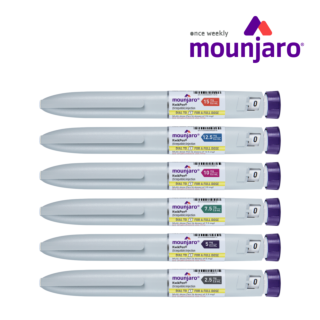Report: Life After Starting Weight Loss Injections
Weight loss injections like Mounjaro and Wegovy are changing the day-to-day lives of people up and down the UK. And their effects go beyond the numbers on a scale.
From confidence and relationships to activity levels and emotional stability, we spoke to 1,000 adults currently using weight loss treatments to understand the wider effects.
Each question focuses on a different aspect of life, revealing how physical health and mental wellbeing often improve hand-in-hand. The data shows that when people receive effective medical support, they don't just lose weight – they regain energy, self-belief, and the freedom to fully engage in life again.
Our survey shows the many ways treatment can support healthier routines, stronger relationships, and a more positive relationship with both body and mind. So read on to find out more!

Have you ever been told to “just eat less and move more”?
Most people using weight loss injections have heard this phrase before – often many times. In our survey, the vast majority said someone had told them to “eat less and move more”, usually as well-intentioned advice.
While the idea itself isn’t inaccurate, it rarely reflects the complexity of weight management. For many respondents, comments like these felt dismissive of the medical, psychological, and lifestyle factors that contribute to weight gain and loss.
People in their 30s and 40s and those who were married were most likely to report hearing the phrase, suggesting these conversations often take place among close family or partners rather than strangers.
Ultimately, the message highlights a gap between common advice and clinical understanding. Sustainable weight loss requires more than willpower - it depends on biology, environment, and support.
At Chemist4U, we want to break the stigma around weight loss injections, combat internalised bullying, and actually help people on their journey – and that starts with fighting the idea that you simply need to “eat less, move more”.

Who, if anyone, has made unsupportive comments about your weight or treatment choice?
Negative comments are a common experience for people using weight loss injections, and they often come from those closest to them. Around 1 in 3 respondents said friends or family had made unsupportive remarks about their weight or treatment, while similar numbers mentioned colleagues or online users.
These findings suggest that stigma around medical weight management isn’t limited to strangers or social media – it also exists within personal relationships and workplaces. Single participants were less likely to report negative feedback than those who were married or living with a partner, indicating that judgment might also come from familiar sources.
Addressing these attitudes is key to helping people feel confident in their treatment decisions. Open, informed discussion can replace criticism with understanding, making it easier for patients to stay motivated and engaged in their progress.

To what extent, if at all, have you felt judged for considering or using weight loss injections?
Feeling judged remains a common experience among people using weight loss treatment. Almost 3 in 4 said they’d felt judged to some degree – and for many, this came from people close to them rather than strangers. Younger adults were the most likely to report judgment, while those aged 55 and over were less affected, suggesting that stigma may ease with age or confidence in personal health choices.
A small but notable 6% said they hadn’t told anyone they were using injections at all, fearing negative reactions. Together, these findings point to a wider social challenge – even as treatment becomes more accepted, outdated assumptions about weight and willpower continue to shape how people feel about their care.

On average, how often do you receive unsolicited advice about your weight or health?
Unwanted advice is a familiar part of life for many people managing their weight. Around 7 in 10 respondents said they “often” or “very often” receive comments about their weight or health, with the highest rates among those aged 25 to 34. These remarks tend to come from well-meaning acquaintances or relatives but can still leave a lasting impact, particularly when patients are already following a medical plan.
Only 6% said they never receive unsolicited advice. For most, these regular reminders reflect how normalised it has become to comment on someone’s body or lifestyle. The findings highlight how crucial it is for people using treatment to have access to trusted, evidence-based information - so that advice comes from healthcare professionals, not social pressure.

What type of unsolicited advice have you received?
The most common advice people hear about their weight still echoes the same outdated ideas – move more, eat less, try harder. Many respondents described being told to rely on willpower or to “do it naturally,” even when they were already following medical treatment. Others were guided towards diet fads or “natural” fixes that had little to do with clinical care.
What stands out is the persistence of this pattern. Almost half of the respondents were offered advice that oversimplified complex health issues. These interactions, however well meant, can reinforce stigma and discourage people from seeking help. The data highlights the need for more informed conversations - replacing opinion with understanding, and advice with evidence.

What emotions do you most often feel when you get unsolicited advice?
For many people using weight loss treatment, uninvited opinions strike an emotional chord. The most common feeling wasn’t anger, but embarrassment - a quiet sense of being judged or misunderstood. Others described using those same moments as fuel, turning frustration into motivation to prove doubters wrong.
A smaller group said comments left them feeling deflated or upset, while only a few were able to shrug them off entirely. This pattern suggests that casual remarks about weight or treatment choices rarely feel harmless to the person hearing them. They remind us that weight management is not just physical – it’s emotional too. How advice is given can either reinforce shame or strengthen self-belief, and sensitivity makes all the difference.

Before starting injections, how many diets or programmes had you tried – and how did they go?
For most people, weight-loss injections weren’t the first step – they were the next one. Nearly everyone in our survey had already tried to lose weight the traditional way, often more than once. Most had cycled through a couple of diets or programmes with mixed results before deciding to try medication.
Around 6 in 10 said they’d given 1 or 2 approaches a fair go but didn’t see lasting change. Another third had tried 3 or more – some more than 5. Only a small handful, just 8%, said they’d never tried a plan before.
It paints a clear picture – people aren’t skipping straight to injections. They’ve been putting in the work, often for years, and are turning to medical help because the old advice just wasn’t achieving the results they wanted.

To what extent do you agree or disagree with the following statement? "I find that negative comments impact my motivation or progress"
For most patients, criticism isn’t background noise – it has real effects. Almost 2 out of 3 said negative comments dent their motivation or progress, while only a small minority said they were unaffected.
This shows how easily stigma can interfere with healthy behaviour change. When conversations about weight are positive and practical, they can reinforce progress. But when they turn critical, they risk discouraging the very actions that support long-term results.

Have these experiences of negative comments or unsolicited advice changed the way you talk about your health journey?
Most people using weight loss injections have changed how openly they discuss their journey. Over 80% said they now limit what they share – with nearly half choosing to speak only to people they trust, and a third avoiding the subject altogether.
This response reflects how powerful social pressure can be. When conversations about weight invite judgement, people tend to withdraw rather than seek support. That matters, because openness often helps sustain motivation and accountability. Creating safe, stigma-free spaces – whether in clinics, online groups, or among friends – can make a measurable difference to treatment success.

Since starting your weight loss journey, have you noticed any difference in how people treat you?
Almost half of respondents said people now treat them more positively. Around a third described mixed experiences – some interactions improving, others not – while smaller groups reported either more negative treatment or no change at all.
The overall pattern suggests that social attitudes are shifting for some, but not evenly. Many people using weight loss treatments continue to encounter inconsistent reactions, highlighting how important understanding and respect remain throughout any weight management journey.

If you've noticed people are treating you more positively, why do you think that is?
The data suggests that positivity often follows visibility. People who’ve experienced more supportive treatment link it mainly to outward signs – physical changes, energy, or confidence – rather than deeper understanding.
This highlights a subtle bias – support tends to grow once progress can be seen. While that can feel encouraging, it also shows how perception shapes empathy. True understanding means recognising effort and resilience at every stage, not only when results are obvious.

If you've noticed people are treating you more negatively, why do you think that is?
The data suggests that negativity is often rooted in misunderstanding. Many believe criticism comes from outdated views about weight loss and medication, or discomfort with the idea of medical support. While a small group felt judged or even envied, the main takeaway is that stigma still shapes how people react to weight loss treatments – showing how much education and empathy are still needed.

What, if anything, do you wish people better understood about your weight loss journey?
For most people, this isn’t about image – it’s about health. Almost half said they wish others recognised that their motivation came from wanting to feel well, not simply to look different.
Many also wanted people to understand that medical help isn’t “cheating.” Weight loss injections are a real, evidence-based treatment – one that makes a difference when traditional methods haven’t worked.
Others wanted acknowledgment that weight is complex. It’s influenced by many factors, not just willpower.
And for nearly a third, the message was clear – their health journey is personal, and they don’t owe anyone an explanation.

Since starting your weight loss journey through injections, what positive changes have you experienced, if any?
Many people using weight loss injections are feeling the benefits well beyond the scales. The most common changes were improved sleep, energy and confidence – the kinds of everyday shifts that make life feel more manageable and rewarding. A third said they were sleeping better and had more stamina, helping them feel more capable in daily routines.
Others noticed brighter moods, stronger self-belief, and renewed motivation to move more or eat better. Around 1 in 4 saw improvements in their physical health or found day-to-day tasks like climbing stairs or carrying shopping easier.
Overall, these findings show that progress isn’t just about numbers lost, but about gaining back comfort, energy, and confidence in everyday life.

Since starting your weight loss journey, have your preferred types of dates changed?
Most people say their dating preferences have shifted since starting weight loss injections. The biggest changes are towards dates that involve doing something together – a walk, a class, or an evening at the theatre. These experiences offer connection and confidence without centring on food or drink.
Around 1 in 5 said their preferences had changed in other ways, showing that dating after weight loss can take many forms. For some, it may be about confidence, for others, simply comfort and energy.
A smaller group said their preferences hadn’t changed, and a few aren’t dating at all. Every response matters. Whether you prefer active plans, shared experiences, or no dates for now, it’s about choosing what feels right for you today.

Are you now more or less likely to suggest an activity-based date (e.g. walking, paddleboarding, hiking, dancing) over a traditional dinner/drinks date since starting treatment?
A large majority say they’re now more likely to suggest active dates over food or drinks. Confidence, mobility, and energy gains from treatment may be opening the door to different ways of connecting and enjoying time together.
Around 1 in 5 haven’t changed their approach, showing that comfort and familiarity still matter just as much as trying something new. Very few said they were less likely to choose activity-based plans, suggesting that increased movement is a positive, natural part of many people’s progress.
This reflects a wider shift seen throughout the survey – that weight loss through medical treatment often brings practical lifestyle changes, not just physical ones.

Have you become more confident in your romantic life since starting your weight loss journey?
Most people using weight loss injections say they’ve become more confident in their romantic lives. Over 80% describe feeling a lift in confidence, suggesting that physical progress often connects with how people see themselves and interact with others.
Overall, confidence appears to be one of the most consistent benefits people report since starting their weight loss journey, extending beyond health to how they relate to others and themselves.

Which types of dates have you preferred most since your weight loss journey began?
This group leans toward dates that get them moving or out in the world. Outdoor plans come first, with around 1 in 4 choosing hikes or time in nature. Close behind are active options like dance or classes, and cultural outings such as theatre or museums. Traditional dinner or drinks still appeals to a solid minority, and light-hearted activities remain popular too.
Read simply, people are spreading their time across a wider range of plans. That can reflect feeling more comfortable in different settings, wanting variety, or just finding joy in doing more than one kind of date.

Since starting your weight loss journey, how do you feel about food-focused dates like restaurants or bars?
Most respondents now feel more relaxed about eating or drinking on dates. 2 out of 3 said their anxiety around food-focused settings has eased since starting their weight loss journey.
For many, this likely reflects a new sense of control and confidence in managing food choices while still enjoying social time. A quarter said their feelings haven’t changed, showing that comfort around eating can depend on personal context rather than treatment alone.
A smaller group still feels anxious about these situations, suggesting that food-related pressure or self-consciousness can remain a challenge even with progress. The overall trend, though, points to greater ease and self-assurance in social settings that once felt difficult.

Since starting your weight loss journey, have you changed your dog-walking habits in any way?
Most people who own dogs say their walking habits have improved since beginning treatment. Nearly 90% have made some kind of positive change, whether that means heading out more often, staying out for longer, or simply finding more enjoyment in it.
The shift suggests that increased energy and confidence are translating into everyday routines. Walking becomes less of a chore and more of a natural part of daily life, bringing benefits for both owner and pet.
Only a small share say their habits haven’t changed, showing how even modest weight loss progress can encourage greater movement and connection through small, regular actions.

Roughly how much time do you spend walking your dog now compared to before your weight loss treatment?
Nearly all dog owners report spending more time walking than before starting treatment. Around 9 in 10 said they’re now out longer, with most adding between 15 and 30 minutes per walk. More than a third are walking over half an hour longer than before.
This shows that everyday activity is rising naturally, not through structured workouts but through lifestyle changes that feel sustainable. For many, walking has become a more enjoyable and regular part of the day.
Only a small minority said their walking habits have stayed the same or reduced, highlighting how improved fitness and confidence can influence even small daily routines.

What new activities with your dog, if any, have you started since beginning your weight loss journey?
Almost half of respondents say they now take longer daily walks with their dogs, showing how improved fitness is filtering into everyday life. Many are also adding play or training sessions, while some have started joining group walks or countryside outings.
These changes suggest that physical activity is becoming more varied and social, not just routine exercise. Dog owners are finding fresh ways to stay active that also strengthen the bond with their pets.
Only a small number said nothing has changed, indicating that even modest progress in weight loss can spark meaningful shifts in energy, motivation, and daily habits.

Conclusion
The findings across all 22 questions show that weight loss injections are influencing far more than physical appearance. For most respondents, the impact extends into daily life, confidence, relationships, and overall wellbeing.
People using treatment report sleeping better, moving more, and feeling more comfortable in their bodies. Many say they are more active without consciously planning exercise – walking more, playing with pets, and enjoying new forms of movement. These changes appear to happen naturally as energy and motivation increase.
Social and emotional benefits also stand out. Respondents describe greater self-confidence, less anxiety around food or public settings, and stronger engagement in romantic and social life. Even small improvements in weight and health seem to create momentum, helping people reconnect with hobbies, routines, and personal goals.
While everyone’s journey is different, the message is consistent – when medical support helps remove barriers, sustainable change becomes possible. Weight loss injections are not a shortcut, but a tool that enables people to live more actively, confidently, and comfortably in their own lives.











